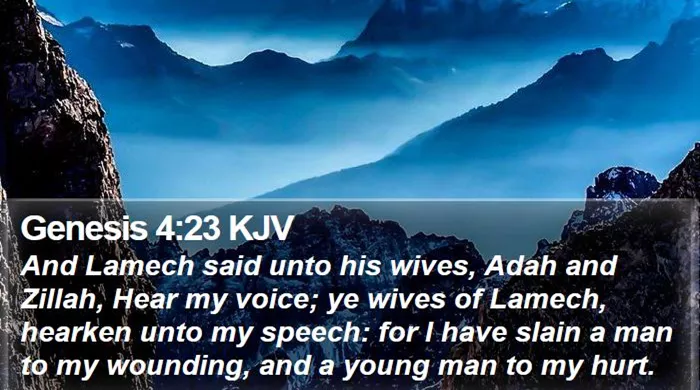Read the Daily Bible Verse Genesis 4:23 To Strengthen Your Spiritual Journey.
The Background of Genesis 4:23 KJV
Genesis 4:23 is a verse that captures a moment of human history soon after the fall of man, marking a critical period in the development of civilization. This verse is part of the genealogical narrative of Cain, following the account of Cain’s murder of his brother Abel. It reads:
“And Lamech said unto his wives, Ada and Zillah, Hear my voice; ye wives of Lamech, hearken unto my speech: for I have slain a man to my wounding, and a young man to my hurt.” (Genesis 4:23 KJV)
This verse is embedded in a context that reflects the early dynamics of human society, sin, and the emergence of familial relationships. Understanding the background of this verse requires a grasp of the narrative leading up to it and the broader themes of Genesis.
The Meaning of Genesis 4:23
Genesis 4:23 is spoken by Lamech, a descendant of Cain, who is the first person mentioned in the Bible to have multiple wives. Lamech’s declaration is significant for several reasons:
The Nature of Lamech’s Deed: Lamech’s speech to his wives reveals a sense of defiance and pride in his actions. He describes having killed a man and a young man, emphasizing that the violence he committed was in response to personal harm or injury, suggesting a revengeful motive. Unlike Cain, who was marked by God to prevent his murder, Lamech’s proclamation does not show remorse or divine intervention.
The Song of Lamech: The verse can be interpreted as a poetic declaration or a song of defiance. This poetic form underscores Lamech’s boastfulness and his attempt to normalize violence. The use of hyperbole in his claim might also be aimed at asserting dominance or justifying his actions within his community.
Moral and Ethical Implications: Lamech’s actions reflect the increasing moral decay among humans. The verse highlights a shift from the original harmony of creation to a society where violence and retribution are becoming more commonplace.
See also: What Does Genesis 4:22 Mean?
The Application of Genesis 4:23 in Life
The application of Genesis 4:23 to modern life can be understood in various ways:
The Cycle of Violence: The verse serves as an early warning about the consequences of violence and vengeance. It underscores how personal injury can escalate into a cycle of violence. In modern contexts, this can be seen in the perpetuation of cycles of retribution and conflict within communities and individuals.
Pride and Justification of Wrongdoing: Lamech’s boastfulness reflects a dangerous tendency to justify personal wrongdoing. This aspect can be applied to contemporary scenarios where individuals or groups rationalize harmful behavior, often ignoring the broader impact of their actions.
Reflection on Justice and Forgiveness: The lack of divine intervention or justice in Lamech’s case prompts reflection on the concepts of justice and forgiveness. It challenges individuals to consider how they handle personal grievances and whether they seek reconciliation or perpetuate harm.
Comparison with Other Bible Texts
Genesis 4:23 can be compared to several other biblical texts to provide deeper insight:
Genesis 4:10-15: The account of Cain and Abel provides a foundational understanding of sin, punishment, and divine mercy. Unlike Lamech, who is boastful, Cain receives a mark from God to protect him, demonstrating a different approach to dealing with sin and justice.
Matthew 5:38-39: In the New Testament, Jesus addresses the concept of retaliation and encourages turning the other cheek, contrasting with the attitude expressed by Lamech. Jesus’ teaching promotes forgiveness and non-violence, offering a counterpoint to the cycle of vengeance seen in Lamech’s declaration.
Romans 12:19: Paul’s exhortation to leave vengeance to God aligns with the principles taught by Jesus, suggesting a more constructive approach to handling personal wrongs. This contrasts sharply with Lamech’s emphasis on self-justification and retaliation.
Modern Significance
Genesis 4:23 has several implications for contemporary society:
Ethical Reflection: The verse challenges individuals to reflect on the ethical implications of their actions and the motives behind them. In an age where acts of violence and personal retribution are prevalent, Lamech’s story serves as a reminder of the consequences of such behavior.
Social Dynamics: The verse highlights issues related to power, dominance, and interpersonal relationships. It encourages a critical examination of how societal norms and values influence behavior and conflict resolution.
Cultural Commentary: Lamech’s proclamation can be seen as a commentary on how societies may glorify or normalize violence. This reflection can inspire discussions about cultural attitudes toward violence and the need for alternative approaches to justice and reconciliation.
Conclusion
Genesis 4:23 provides a powerful lens through which to view early human society’s grappling with sin, violence, and moral decay. The verse’s depiction of Lamech’s boastful declaration of violence against those who wounded him underscores the growing normalization of retribution and violence. By comparing it with other biblical texts and reflecting on its modern significance, one can gain valuable insights into ethical behavior, the cycle of violence, and the pursuit of justice and forgiveness.
Commentary on Genesis 4:23
Commentaries on Genesis 4:23 often focus on Lamech’s character and the implications of his speech. Scholars view Lamech’s words as indicative of a deepening moral crisis within humanity, reflecting a departure from the original divine intent of harmony and peace. His speech is seen as an early expression of human arrogance and the normalization of violence as a response to personal grievances.
Lamech’s proclamation is also interpreted as a manifestation of the ongoing struggle between human tendencies toward violence and the divine call for righteousness. The absence of divine intervention or correction in Lamech’s case further emphasizes the need for personal and communal accountability in addressing violence and injustice.
In sum, Genesis 4:23 is a rich text that offers profound insights into the nature of sin, violence, and human behavior, challenging readers to reflect on their own lives and the broader implications of their actions within society.


